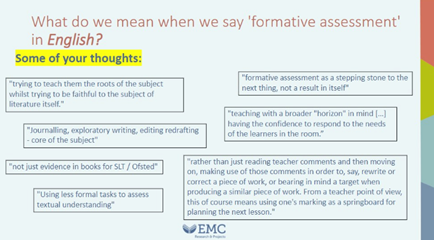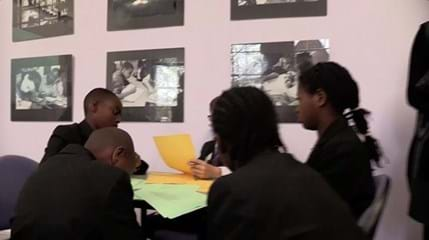It’s a while since I’ve blogged on vocabulary, though I’ve continued to regularly tweet about it, expressing concerns about the way in which it has come to dominate thinking about how to develop students’ writing and uses of language, as well as improving reading and comprehension.
I want to stress that my criticisms are not of individual teachers, who are working hard to support and develop their students on the basis of the best evidence and arguments they can find, constantly weighing and balancing competing ideologies and ideas and working within their own school’s framework, whatever that may be. My critique is focused on the arguments themselves, but also on those with influence and power who have been strongly promoting the simplistic idea that word knowledge is a ‘proxy’ for all language learning (or indeed, sometimes, all learning) and that teaching academic vocabulary, or specialist subject vocabulary, is the main route to academic success. These powerful voices include Ofsted, whose influence is undoubtedly hugely significant in terms of the choices teachers and schools make.
In their recent English Subject Review, though they have attempted to take on board the fact that vocabulary is much more than just learning word lists, vocabulary still remains a cornerstone of their thinking and what they are looking for as evidence of good work on literacy in schools. There are whole sections devoted to it in the Review, as compared with other key aspects of language such as grammar. The word ‘vocabulary’ is used 95 times, as compared with 17 for ‘syntax/syntactical’ & 21 for grammar/grammatical and just one solitary reference to ‘discourse’.
As Megan Dixon said, in a tweet on this topic in early December:
Please can we recognise that literacy is about communication and vocabulary is NOT the only thing that matters! Words are important- but how the words are put together is just as important.
This chimes very much with my view. Yes, of course words matter but they are far from the whole story. Words are put together to make meaning. In terms of student writing, the mere fact of knowing more elaborate or sophisticated words or terms, does not guarantee better communication of those meanings. In fact, I would argue that placing the emphasis on the words themselves, rather than on the meanings, can lead to worse writing. It’s quite a subtle distinction but a really important one. Pay attention to what you want to say, think about how best to say it, and then consider (among many other things) the words that will help you say it best.
For English teachers, there are two elements to the debate – the teaching of academic and sophisticated vocabulary in general, and then the teaching of literary and linguistic terms more specifically for GCSE and A Level. For both aspects, the past few years could be characterised by pressure to teach words and terms for their own sake, rather than teaching ideas, thoughts and responses and then developing the language in which to best express those. So, crudely, it can look like this: ‘here are some words you will find helpful, or are necessary for success in this subject, or will make you sound really academic, or need to go into this paragraph’ rather than ‘what do you want to say and how best can you say it?’
On social media, there have been plenty of people arguing that teaching words gives students their most powerful resource for writing well. This is born out of a highly commendable desire to extend and develop students’ linguistic repertoire. But is it working? Surely the proof must be in the pudding. What kind of writing has been emerging from this kind of emphasis in schools on vocabulary? For a good while I’ve been asking for examples of student writing generated by an emphasis on vocabulary that demonstrates the success of this approach. I have never been sent any. To be fair, perhaps teachers feel anxious about sending me something and having it critiqued, though given how much is published on social media these days, it’s a bit surprising not to see more such work being confidently shared. So, I have to rest on my own experience of reading a great deal of student writing, submitted for emagazine, or as entries in our annual poetry and close reading competitions, or the writing we see through our work (GCSE and A Level) and the consistent messages from Examination Reports at both GCSE and A Level. All of these suggest that it is extremely rare for students to handle well a large panoply of elaborate literary terms, or have too much focus on using ‘academic’ or ‘ambitious’ words in their own writing. It occasionally happens but it's very unusual. I see writing from every kind of school, up and down the country and what I witness is often the work of highly motivated and aspiring students. Yet it is the students who use language simply and directly, selecting the most significant terms of the subject – such as voice, point of view, contrast, tone, rhyme, rhythm, parallels, oppositions, characterisation, narrative arc and similar – and using general vocabulary to genuinely suit the purposes, who write best of all.
I am usually very wary of sharing student writing in order to criticise it. I much prefer to share great writing – and that’s what we do a lot of, in publishing brilliant student work in emagazine and applauding achievements in student competitions, blogs and so on. But it’s hard to make the case fully, without at least some exemplification of what’s going wrong. So, here I’m going to offer a sample of the many similar pieces of writing that we received in a student close reading competition a few years’ ago. Students sign something saying that we can use their entries, anonymised, more widely, and I hope that by choosing a past competition and selecting a small enough extract from each entry, were the students themselves to see these, they would not recognise themselves here.
Of course, I applaud the students for their efforts and enthusiastic engagement with the text, and for their desire to write in sophisticated ways. They are potentially high-achieving students. I don’t, however, think that teaching them obscure terms and ‘ambitious’ vocabulary has done them many favours. In each case, I suggest an alternative wording or phrasing that I think might have made their writing so much better!
1. The anaphoral use of sibilance within the extract’s exposition, ‘spiritual soothing’ and ‘southern sun’, can also be interpreted as a further emblem of the hidden Christian motif; the ‘ess’ sound’s repetition has clear connotations to the snake, the form of the devil when he deceived Eve.
The repeated use of sibilance might be suggestive of the deceptive serpent, destroying innocence in the garden of Eden.
2. After hyperbolising Ness’s past as “Hell”, the paragraph ends, signifying a decisive termination of reflection.
The paragraph ends suddenly, after powerful depictions of Ness’s past as ‘Hell’, bringing an abrupt end to all reflection.
3. …the third person narrative voice juxtaposes a sustained quotidian, detached tone with ineffably raw description to create a disconcerting, yet alluring atmosphere for the reader. An excerpt about the confounding struggle for identity, the narrator inserts jarring semantic incongruities throughout to disorientate its recipient.
An everyday detached tone in the third person combines with raw description to create a disconcerting, jarring mood. The reader is disorientated by this.
4. Although catalysed by lamentable suffering, the idiomatic release gives rise to an unexpected semantic of Christian mercy - the name Ness becoming synonymous with ‘divine…gift…’.
There is lamentable suffering, followed by release and mercy, expressed in simple, idiomatic language.
5. This passage characterizes the subjugation of westernisation, predating a cultural hegemony over Africa, stemming from lucrative trade; as well as Gyasi’s analepsis which terminates hope and instead distils a tone of undeviating pessimism.
The slave trade caused the subjugation of a people, and Gyasi’s early revelation of the outcome of events destroys all hope and leaves the reader with a sense of pessimism.
6. Ness experiences an early anagnorisis at the beginning of the extract: […] It’s inferable that this insinuates the viewpoint that one’s role in abolishment doesn’t vindicate past involvement in the slave trade – considering the erasure of identity and culture, perhaps Gyasi is proposing reparations for the ‘Scramble for Africa’.
(I’m unable provide a gloss for this one that genuinely expresses what is going on in the novel extract, or captures what this student is trying to say).
7. The ramifications of societal dissonance are entrenched within the plot to emphasise how irregular Ness and Esi’s lives are.
The ramifications of racism are visible in the abnormality of Ness and Esi’s lives.
8. Therefore, the white masters exude a metaphor of a sailor sitting safely on their boat, whipping out its anchor when needed and exploiting its use.
The writer uses the metaphor of a sailor sitting safely on their boat and lowering the anchor, to express the white masters’ exploitation of the slaves
9. Through the writers’ use of another antonomasia,”Frownie”, a woman who “never smiled” and stayed “solid and strong” displays pure neglect and heartlessness towards her daughter.
The writer’s use of the name ‘Frownie’ for the mother, and her statement that she ‘never smiled’, both suggest heartlessless and neglect. However…
10. This combined with the present tense whereupon the beginning is told gives a lack of distinction to the character as well as the slaves; arguably, the effect could perhaps provide a sense of awareness to the reader, which alerts them of the slave trade at that time while also generalising them to the point of dehumanisation; a recurring topic within the extract.
The use of the present tense contributes to the way the characters’ dehumanised lives are generalised to represent slavery as a whole.
11. The author doesn’t shy away from the harsh reality slaves were immersed in, absolving from any tentative flowery language.
The writer conveys the harsh reality of the slaves’ lives, by avoiding any flowery language or softening of the message.
12. This is seen to truly exploit the nefariousness and the detriments of colonialism in Africa. […] Esi lips ‘’stood in that same thin line’’ indicating the emphatic graphic language which is used to orchestrate the concept of generations of slavery, leading to a cyclical climate.
Colonialism is depicted as horrific, the graphic language suggesting a cycle of generations of suffering.
13. This extract is an effective paragon of life as a slave;
This extract exemplifies brilliantly the life of a slave.
14. The night’s sky is a defiant nonchalance when faced with the American sun.
The night sky seems defiantly unconcerned, when faced with the hot American sun.
As I say, these extracts are not the only ones – they are representative examples. And in each year of the competition we see similar – though I have to say that very recently there has been a very encouraging tipping back in some schools’ entries towards a much more proportionate approach to literary terms and academic vocabulary.
Despite Ofsted’s continuing obsession with vocabulary and neglect of other aspects of language and ways of developing student writing, I hope that teachers’ own experiences and what they see of student writing will encourage them to look beyond the simplistic solutions to see words for what they really are – one vital element in the complex web of aspects of meaning-making.
Finally, how might one encourage students to use language that avoids this kind of over-egged, ill-judged use of vocabulary? How can we help them develop language that is genuinely academic, rooted in the subject and well-chosen in terms of communicating understandings and insights? That might be a whole new blog, or even a CPD day, but here are just a few suggestions:
- Offer students examples of the kind of writing shown above and ask them to talk about them, and then gloss them more simply and clearly as I have done, deciding which terms are useful and worth retaining and which are not. (You’ll see that I haven’t by any means excised all terms or academic vocabulary in my gloss – just removed poorly used words, words that seem to be there just for the sake of sounding good, or ones that don’t pay their way. I have simplified to make sure that the meaning is clear).
- Show them writing by academics that is clear, direct, judicious in terms of its use of vocabulary and offers a model of the kind of writing they might be aiming for. (emagazine has plenty of examples, as does EMC Doing Close Reading publication!)
- Read with students George Orwell’s writing about good prose or share with them these choice extracts:
- Good writing is like a window pane.
- Bad writers, and especially scientific, political and sociological writers, are nearly always haunted by the notion that Latin or Greek words are grander than Saxon ones, and unnecessary words like expedite, ameriorate, predict, extraneous, deracinated, clandestine, sub-aqueous and hundreds of others constantly gain ground from their Anglo-Saxon opposite numbers.
- The inflated style is itself a kind of euphemism. A mass of Latin words falls upon the facts like soft snow, blurring the outlines and covering up all the details. The great enemy of clear language is insincerity. When there is a gap between one’s real and one’s declared aims, one turns as it were instinctively to long words and exhausted idioms, like a cuttlefish spurting out ink.
- Encourage students to speak aloud what they want to write first, so that they can express it as clearly and directly as possible. This can be done before putting pen to paper, or alternatively if you’ve seen a piece of writing from them that seems overly elaborate and unclear, they can do this as part of a re-drafting process, in order to clarify and simplify.
- Encourage students to read aloud their writing, so that they can hear for themselves where sense has been sacrificed at the altar of ambitious vocabulary.
- Mark student writing for valid and insightful ideas, rather than praising use of vocabulary for its own sake.
- Use the most common and useful terms of the subject in class talk, naturally integrated into the discussion, so that students become familiar with these and confident in how they are used. Gloss them as you go. For instance, ‘what did you think of the narrative arc, by contrast with the novel by X? By narrative arc, I mean the trajectory, the movement from a state of happiness to one of grief, or from poverty to riches, or innocence to corruption.’ Or ‘How does the writer introduce the main character, the protagonist?’ This kind of reinforcement with synonyms and repeated use means that students will absorb useful terms along the way, and in valid contexts, as used correctly and appropriately by you.
- The emphasis for me should be on nailing big concepts rather than labelling obscure, infrequently occurring small figures of speech. So, avoid teaching lists of anaphora, anadiplosis, zeugma, hypophora and so on. By contrast, teaching ‘hyperbole’ or ‘hyperbolic language’ as a big idea is really helpful in discussing many texts, from Macbeth and The Rape of the Lock to Frankenstein. In an agenda-setting lesson at the start of Shelley’s novel, I’d happily talk about the hyperbolic language and gloss it as I went e.g. ‘We’ve noticed the use of exclamations, the heightened emotions, the exaggerated, over-blown imagery. This is hyperbolic language – exaggerated, heightened language.’
- Offer students 4 or 5 versions of a paragraph on a text for them to discuss in terms of quality of language and use of vocabulary and literary terms, as well as ideas. (I did this at a recent emagazine conference on the Edexcel Poems of the Decade component, where I wrote 5 example paragraphs for students to critique and rank in order of how good they were.)




